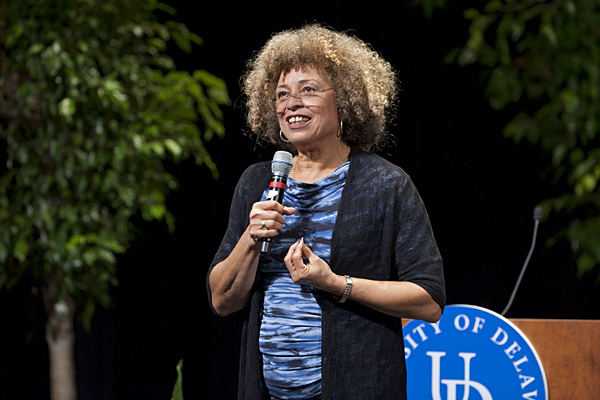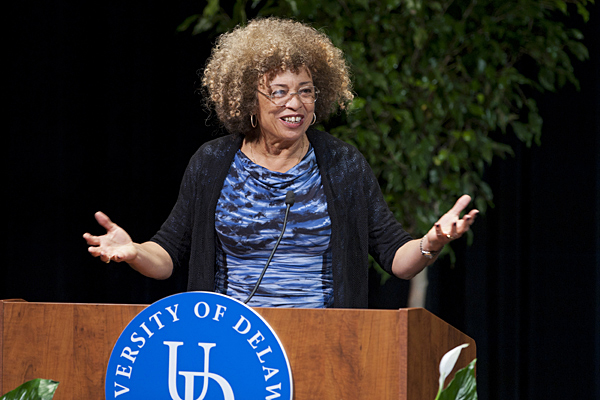Advocating change
Angela Davis looks back on 40 years of social activism
4:34 p.m., Oct. 21, 2011--Educator, author and activist Angela Davis told a multi-generational audience in the University of Delaware's Mitchell Hall on Thursday, Oct. 20, that they can count on one thing in life:
"Things change," she said during her talk, held as part of this year's celebration marking the 40th anniversary of Black American Studies at the University. "Things always change. Sometimes it's for the better, sometimes for the worse. It's never guaranteed."
Campus Stories
From graduates, faculty
Doctoral hooding
Davis, who today is Distinguished Professor Emerita at the University of California Santa Cruz, is four decades past the time when she first gained national attention as a political and social revolutionary and outspoken supporter of the Communist and Black Panther parties. But, she said, she still works for change in the United States and the world, and she encouraged members of her audience to do the same.
She described meeting recently with some young people active in the Occupy Wall Street protests and said their enthusiasm for change gave her hope for the future. "It reminded me that 40 years ago, we really thought we were making a revolution," she said. "There really is hope for us now."
Americans, she said, "need a sense of ourselves as global citizens" and must "imagine ourselves as part of a much larger community than just the United States of America."
Davis also spoke about a cause on which much of her recent advocacy, lecturing and writing has focused—abolition of the death penalty and, ultimately, of prisons. She urged the U.S. to eliminate the death penalty "for many reasons [including the fact that] it is one of the most obvious examples of institutionalized racism in this country."
African Americans are disproportionately sentenced to death, and the penalty is statistically more likely to be imposed in cases with white victims, she noted. But, she said, statistics don't address the key problem with the death penalty or the entire prison system.
"You don't create equality by executing as many white people as you execute black people," Davis said. "You could execute many more white people, but the institution is still racist." She described the prison system as a place where America conceals problems it should instead be solving through better education, drug treatment and access to mental health care.
Her talk, titled "New Terrains of Resistance," also addressed some of the past, present and future issues involved in the academic discipline of black or ethnic studies, which is known by different names at different schools. UD's Black American Studies program began 40 years ago and recently was awarded departmental status in the College of Arts and Sciences.
Hundreds of such programs began in the late 1960s and early ’70s at colleges around the U.S., Davis said, often because of pressure from activist campus groups of black, Latino and progressive white students and faculty members. But many have since been disbanded.
"You should applaud yourselves," she told the UD audience. "Black studies is still here."
Davis, whose academic background is in philosophy, said black studies is inherently interdisciplinary—involving political science, history, literature, feminist studies and many other areas—and is a useful lens to use in viewing a variety of social issues and scholarly work.
Before taking questions from the audience, Davis concluded her talk by calling for "a world in which human problems are taken seriously" by providing for such needs as housing, jobs, education and health care. "We need hope, we need peace, we need justice, we need creativity, we need equality, and we need freedom," she said.
Davis earned her bachelor's degree at Brandeis University, a master's degree at the University of California San Diego and a doctorate at Humboldt University. She was an assistant professor of philosophy at UCLA in 1969 when she was fired for being a Communist Party member, but a court ruling forced the school to rehire her. The following year she was the subject of a law enforcement manhunt that ended in her arrest and trial on charges of murder, kidnapping and conspiracy. She was acquitted in 1972.
She ran for the vice presidency in 1980 and 1984 on the Communist Party ticket.
Davis is the author of several books, including Angela Davis: An Autobiography; Women, Race, and Class; Women, Culture and Politics; and Are Prisons Obsolete?
Her appearance at UD was sponsored by the Department of Black American Studies, the College of Arts and Sciences, the Provost's Office, the Office of the President, the Center for Black Culture, the Division of Student Life, the Office of Equity and Inclusion and the departments of Women's Studies and History.
Article by Ann Manser
Photos by Evan Krape












